13 Top AI Courses for Compensation Analysts in 2025
Discover the leading AI courses tailored for compensation analysts in 2025. Enhance your skills with programs that cover data analytics, machine learning, and AI-driven decision-making to stay ahead in your field.

The rapid advancement of artificial intelligence (AI) is transforming industries across the globe, and the field of compensation analysis is no exception. As AI continues to evolve, it becomes increasingly important for professionals to upskill and adapt to these technological changes. For Compensation Analysts, staying ahead of AI trends is crucial not only for maintaining relevance in their current roles but also for enhancing their career prospects. The integration of AI into compensation analysis is expected to redefine job functions, streamline processes, and increase accuracy, making it imperative for professionals in this space to gain a comprehensive understanding of AI technologies.
Why AI matters for Compensation Analysts today
AI has become an integral part of modern business operations, with studies indicating that 69% of businesses are actively utilizing AI technologies. This trend underscores the necessity for Compensation Analysts to understand and leverage AI in their day-to-day tasks. The purpose of this article is to guide Compensation Analysts in identifying the most suitable AI courses that can enhance their skillset and position them as experts in their field. By exploring a diverse range of courses, professionals can find tailored educational opportunities that align with their career goals and the demands of the industry.
The Growing Role of AI in Compensation Analysts
AI is making significant inroads into compensation analysis by automating routine tasks, enhancing decision-making processes, and enabling more personalized compensation strategies. Applications such as predictive analytics, machine learning models, and data-driven insights are reshaping how Compensation Analysts approach their work. These technologies allow for more efficient data processing and provide deeper insights into compensation trends and patterns, ultimately leading to more informed and strategic decision-making. As AI capabilities continue to expand, Compensation Analysts will find themselves at the forefront of innovative compensation solutions.
Benefits of becoming an AI expert in Compensation Analysts
Gaining expertise in AI offers numerous benefits for Compensation Analysts. By understanding and applying AI technologies, professionals can improve the accuracy and efficiency of their analyses, leading to more competitive compensation packages and better alignment with organizational goals. Additionally, AI expertise can empower Compensation Analysts to take on more strategic roles within their organizations, driving innovation and contributing to business success. As AI continues to shape the future of compensation analysis, those who embrace these technologies will be well-positioned to lead in their field.

Comparison: All AI Courses for Compensation Analysts (Updated Q2' 2025)
| Course Name | Provider | Price | Key Topics | Pros | Cons | Best For |
|---|---|---|---|---|---|---|
| AI for Compensation Analysts | CompleteAI Training | $29/month (monthly), $8.25/month (annually) | Specialized AI courses, Certifications, AI tools updates | Highest rating, Extensive courses, Daily updates, Affordable | Subscription based | Compensation Analysts |
| GenAI for Compensation, Benefits and Payroll | Coursera | Free to enroll; Certificate $49 | Generative AI, Automation, Personalization, Compliance | Practical approach, Ethical AI use, Flexible schedule | Intermediate knowledge required, Certificate cost | General learners |
| GenAI for Compensation Analysis in Law Firms | Coursera | Free to enroll; Certificate $49 | Compensation analytics, Legal industry focus | Domain-specific, AI-driven analytics | Niche applicability, Certificate cost | General learners |
| Generative AI in HR - Impact and Application | Coursera | Free to enroll; Certificate $49 | AI in HR, Talent management, Workforce planning | Wide HR coverage, Self-paced | Less specialized for compensation, Certificate cost | General learners |
| GenAI for People and Talent Management | Coursera | Free to enroll; Certificate $49 | AI in talent management, Recruitment, Retention | Relevance for HR, Flexible format | Not focused on compensation, Certificate cost | General learners |
| Certified Compensation Analyst (CCA) 2 Week Online Program | Compensation Analyst Academy | $3,850 USD | Job analysis, Salary surveys, Incentive plan design | Interactive learning, Industry book included | $50 deposit, High tuition | General learners |
| Certified Compensation Analyst (CCA) 1 Week Online Program | Compensation Analyst Academy | $3,850 USD | Intensive curriculum, Fast-track certification | Fast-track, Comprehensive curriculum | Intensive schedule, High tuition | General learners |
| Certified Compensation Analyst (CCA) Executive Program | Compensation Analyst Academy | Inquire for pricing | Executive compensation, Global practices, Analytics | Advanced topics, Global focus | Pricing not specified, Experience required | General learners |
| Certified Compensation Professional (CCP) | WorldatWork | Varies (several thousand USD) | Base pay, Variable pay, Executive compensation | Industry standard, Comprehensive coverage | Significant coursework, Membership recommended | General learners |
| SHRM Certified Professional (SHRM-CP) | Society for Human Resource Management (SHRM) | Several hundred USD | HR policies, Workforce management, Employee relations | Globally recognized, Broad HR knowledge | Ongoing development required | General learners |
| Associate Professional in Human Resources (aPHR) | HR Certification Institute (HRCI) | $400 USD | Foundational HR principles, Recruitment, Compensation | Beginner-friendly, Validates HR knowledge | Less specialized in compensation | General learners |
| Professional in Human Resources (PHR) | HR Certification Institute (HRCI) | $395 USD | Operational HR management, U.S. laws, Compensation | Recognized credential, Detailed coverage | Experience required | General learners |
| Certified Employee Benefit Specialist (CEBS) | IFEBP & Wharton School | Varies (several thousand USD) | Employee benefits, Health plans, Investment strategies | Deep specialization, Reputable institutions | Time-intensive coursework | General learners |
Understanding AI Training for Compensation Analysts Professionals
As artificial intelligence continues to integrate into various professional fields, compensation analysts are not left behind. AI courses tailored for these professionals aim to equip them with the necessary skills to handle complex data and automate processes, ultimately enhancing their efficiency and effectiveness. This article provides a detailed comparison of notable AI courses available for compensation analysts, highlighting their features, targeted audience, pros, and cons.
Course 1: CompleteAI Training
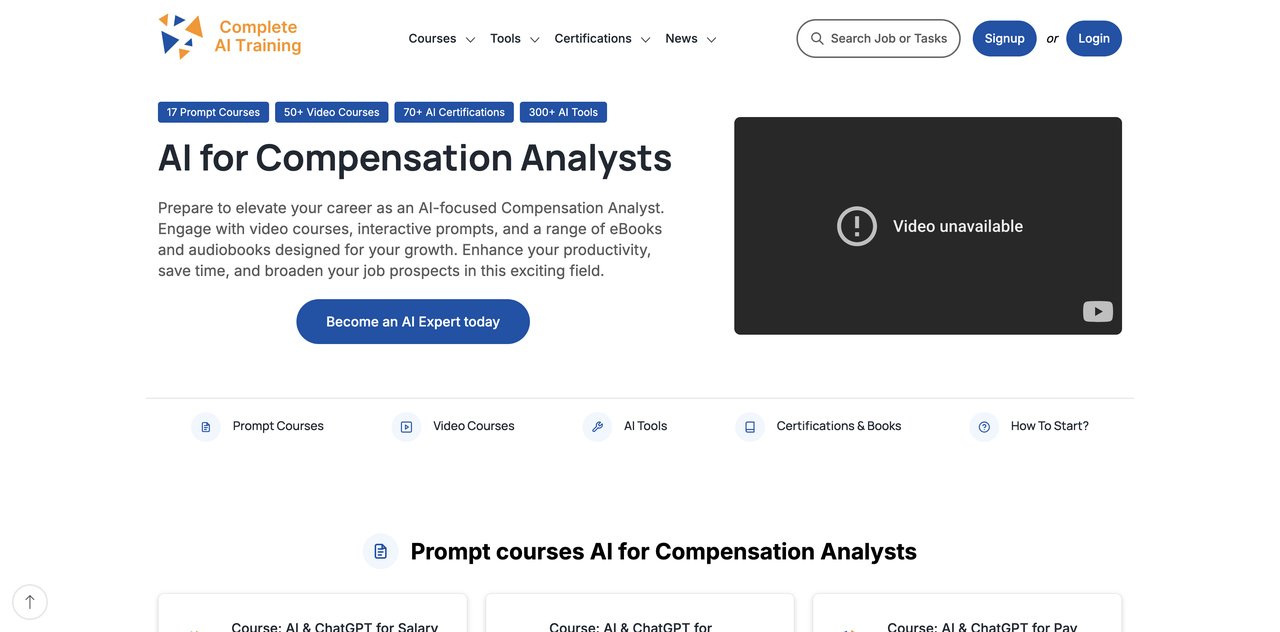
CompleteAI Training offers an extensive library of over 100 specialized video courses and certifications, specifically designed for compensation analysts. This course includes comprehensive AI education, daily updates on the latest AI tools, and curated AI industry news relevant to compensation analysts.
Key Topics Covered: AI tools for compensation analysis, automation in HR processes, industry news updates.
Target Audience and Skill Level Requirements: Designed for compensation analysts seeking continuous learning and development in AI.
- Pros:
- Extensive range of courses tailored specifically for compensation analysts.
- Highest rating and most complete offering in this niche.
- Daily updates on relevant AI tools and news.
- Very affordable pricing, especially with annual billing.
- Cons:
- Subscription-based model; continuous learning required as AI develops.
CompleteAI Training for Compensation Analysts is most beneficial for those looking to keep up-to-date with ongoing AI advancements in the compensation field.
Course 2: GenAI for Compensation, Benefits and Payroll by Coursera
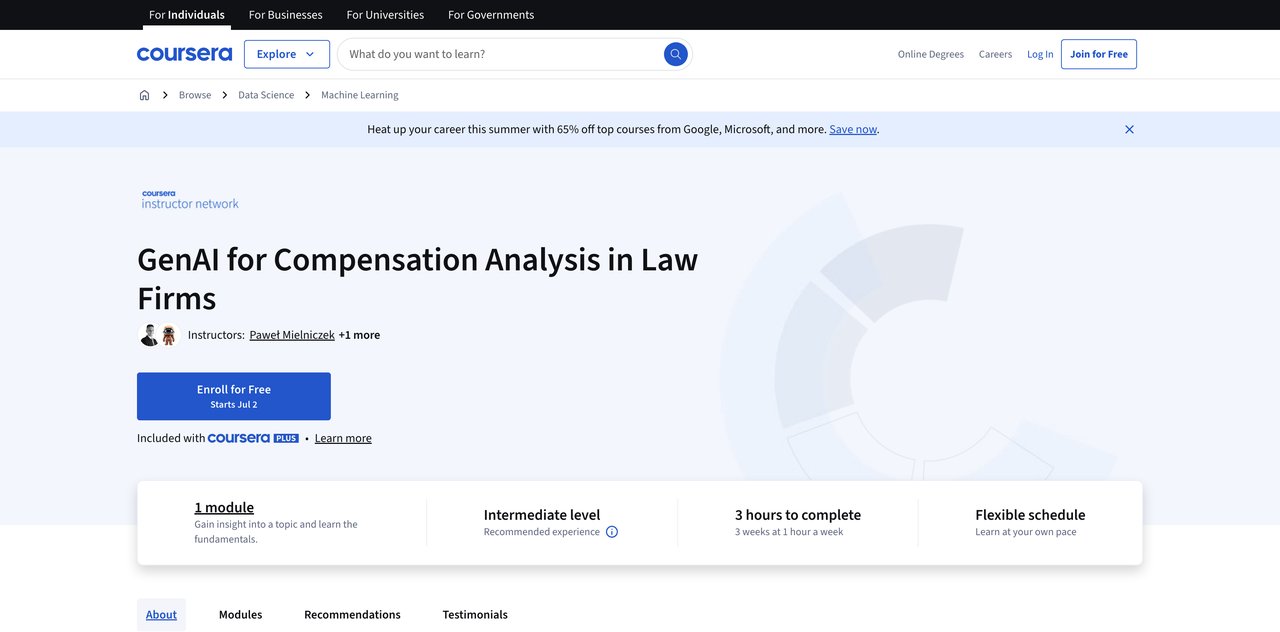
This Coursera course is designed to equip compensation analysts and HR professionals with practical knowledge on leveraging generative AI in compensation, benefits, and payroll functions. It covers foundational AI concepts, automation, personalization, compliance, and ethical considerations in HR operations.
Key Topics Covered: Generative AI in compensation and benefits, automation, compliance, and ethical AI use.
Target Audience and Skill Level Requirements: Suitable for HR professionals and compensation analysts with intermediate knowledge of compensation and payroll fundamentals.
- Pros:
- Practical, hands-on approach tailored for professionals.
- Focus on ethical AI use and compliance.
- Flexible schedule with a short time commitment.
- Shareable certificate to enhance LinkedIn profile or resume.
- Cons:
- Requires intermediate knowledge of compensation and payroll.
- Certificate requires payment after auditing free content.
GenAI for Compensation, Benefits and Payroll by Coursera is ideal for professionals seeking practical AI applications in HR.
Course 3: GenAI for Compensation Analysis in Law Firms by Coursera
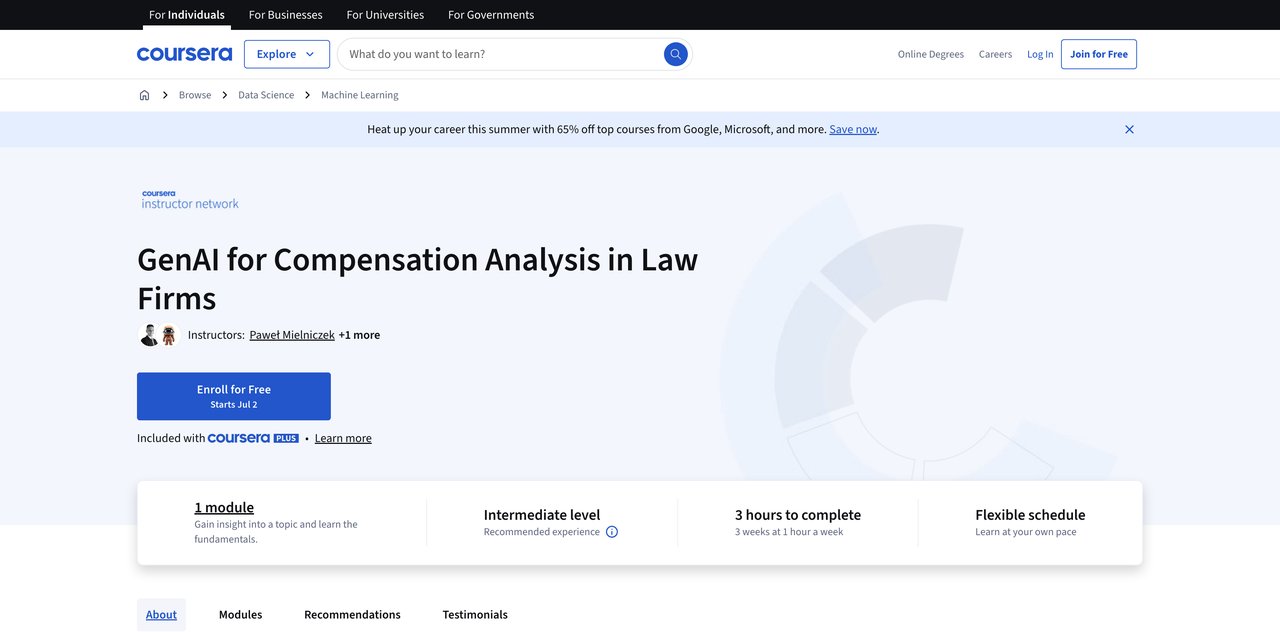
This specialized course focuses on compensation analysis in legal firms, teaching how to apply generative AI for domain-specific compensation analytics and reporting. It is designed for compensation analysts working within the legal industry.
Key Topics Covered: AI-driven compensation analytics, compliance, and reporting for legal firms.
Target Audience and Skill Level Requirements: Best suited for compensation analysts in the legal or professional services sectors.
- Pros:
- Domain-specific focus for legal industry professionals.
- Covers AI-driven compensation analytics and compliance.
- Cons:
- Niche applicability—most beneficial for those in legal or professional services.
- Certificate requires payment after auditing free content.
GenAI for Compensation Analysis in Law Firms by Coursera is well-suited for legal industry professionals seeking specialized AI skills.
Course 4: Generative AI in HR - Impact and Application of Gen AI by Coursera
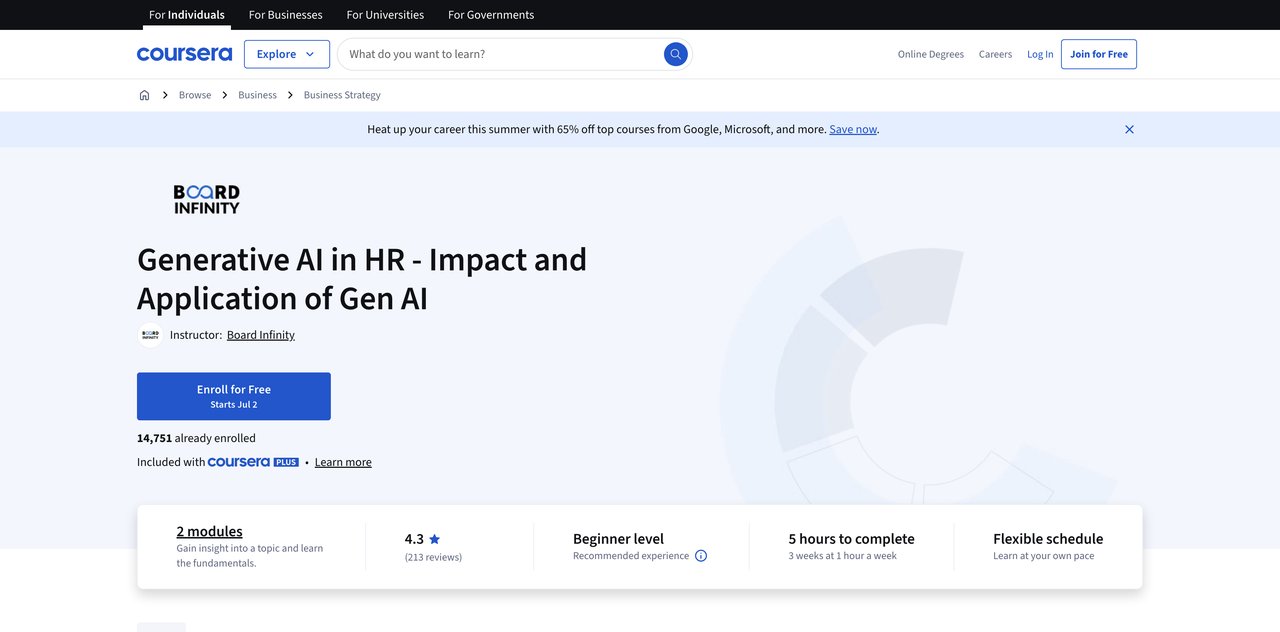
Offering a broad overview of generative AI applications in HR, this course covers areas such as compensation, talent management, and workforce planning. It is suitable for HR professionals at all levels who wish to understand the impact and practical uses of GenAI.
Key Topics Covered: AI applications in HR functions, talent management, and workforce planning.
Target Audience and Skill Level Requirements: Suitable for HR professionals seeking to understand AI's impact on various HR functions.
- Pros:
- Covers a wide range of HR functions impacted by AI.
- Flexible, self-paced learning.
- Suitable for HR professionals at all levels.
- Cons:
- Less specialized for compensation analysts.
- Certificate requires payment after auditing free content.
Generative AI in HR - Impact and Application of Gen AI by Coursera provides a comprehensive overview for HR professionals interested in AI applications.
Course 5: GenAI for People and Talent Management by Coursera
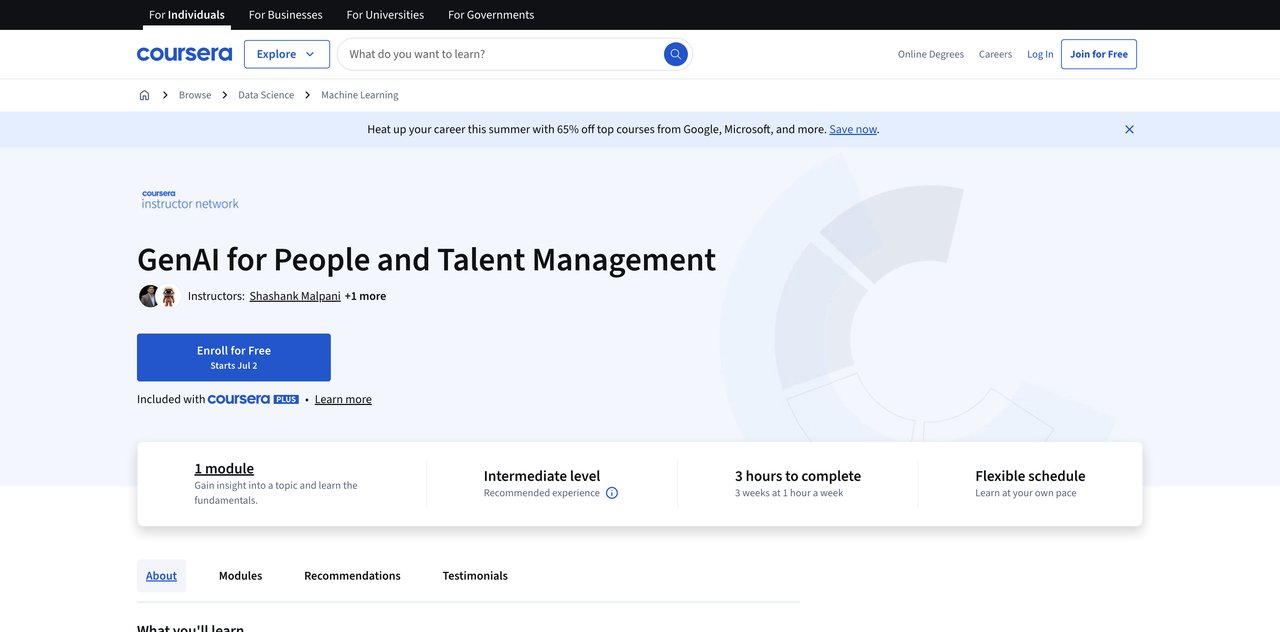
This course focuses on applying generative AI in talent management, including recruitment, retention, and workforce analytics. It is designed to complement compensation analysis by offering insights into AI-driven people management.
Key Topics Covered: AI applications in talent management and workforce analytics.
Target Audience and Skill Level Requirements: Relevant for HR professionals seeking to broaden their AI skills in people management.
- Pros:
- Covers AI applications in talent and people management.
- Relevant for HR professionals seeking to broaden AI skills.
- Flexible, self-paced format.
- Cons:
- Not focused exclusively on compensation analysis.
- Certificate requires payment after auditing free content.
GenAI for People and Talent Management by Coursera is ideal for HR professionals interested in expanding their AI expertise.
Course 6: Certified Compensation Analyst (CCA) 2 Week Online Program by Compensation Analyst Academy
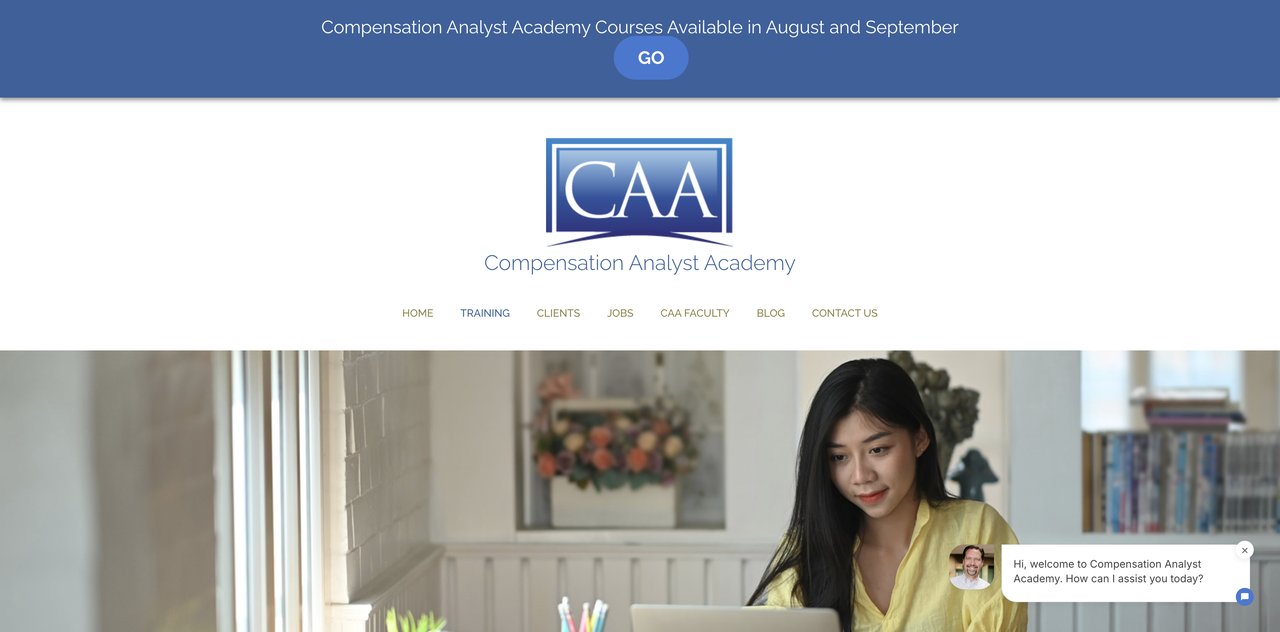
This live, instructor-led online program is designed for compensation analysts seeking comprehensive training in compensation administration and management. Over two weeks, participants cover job analysis, job evaluation, salary surveys, and more.
Key Topics Covered: Compensation administration, job evaluation, salary surveys, incentive plan design.
Target Audience and Skill Level Requirements: Suitable for professionals seeking in-depth training with interactive learning.
- Pros:
- Live instructor-led sessions with interactive learning.
- Includes key industry book authored by the instructor.
- Designed to fit around working professionals' schedules.
- Group interaction with a minimum of 5 participants.
- Cons:
- Requires a $50 non-refundable deposit upon registration.
- Tuition is relatively high.
Certified Compensation Analyst (CCA) 2 Week Online Program by Compensation Analyst Academy is best for professionals desiring comprehensive, interactive training.
Course 7: Certified Compensation Analyst (CCA) 1 Week Online Program by Compensation Analyst Academy
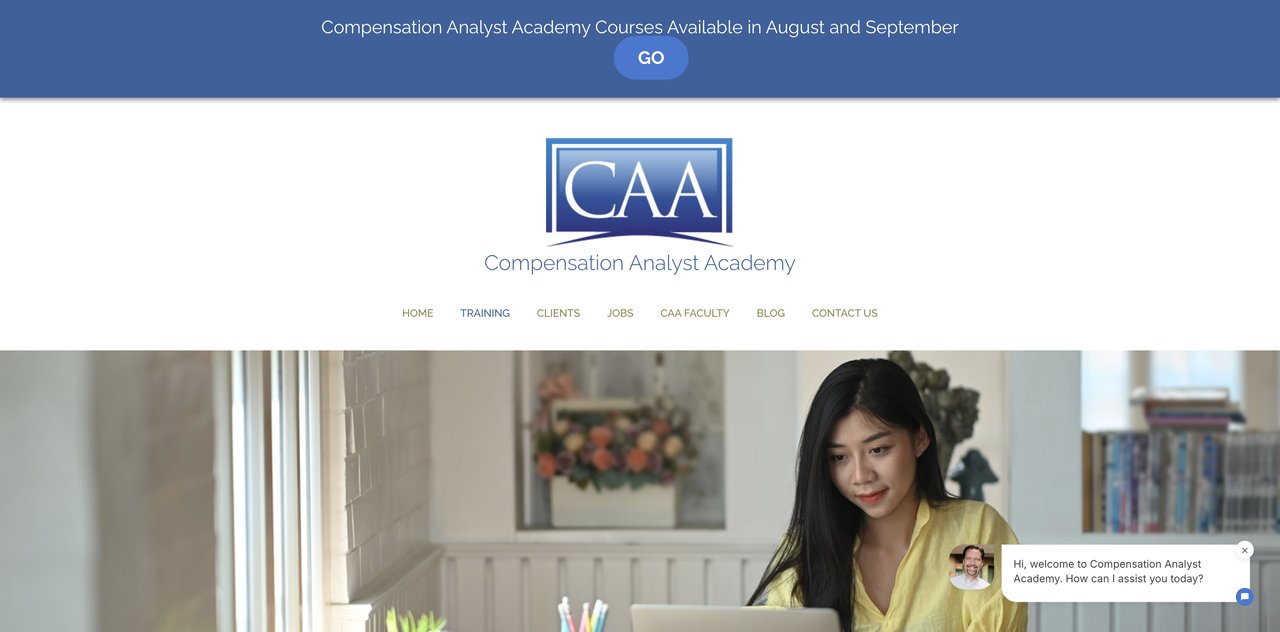
This accelerated, intensive program condenses comprehensive compensation analyst training into one week. It covers the same curriculum as the 2-week program, ideal for those seeking fast-track certification.
Key Topics Covered: Comprehensive compensation training including job analysis, evaluation, and incentive design.
Target Audience and Skill Level Requirements: Suitable for busy professionals seeking a fast-track certification.
- Pros:
- Fast-track option for busy professionals.
- Same comprehensive curriculum and materials as the 2-week program.
- Live sessions promote engagement and immediate feedback.
- Cons:
- Intensive schedule may be challenging for some participants.
- Same tuition cost as the longer program.
Certified Compensation Analyst (CCA) 1 Week Online Program by Compensation Analyst Academy is ideal for those seeking a rapid certification process.
Course 8: Certified Compensation Analyst (CCA) Executive Program by Compensation Analyst Academy
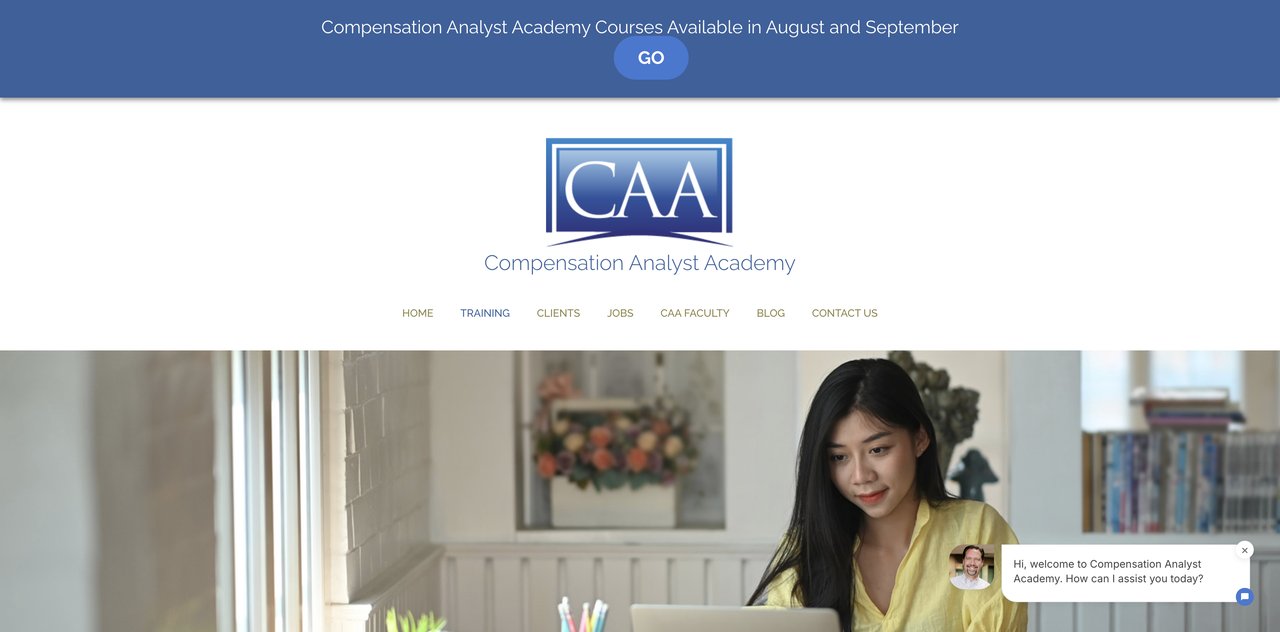
This advanced program focuses on executive compensation and specialized topics such as short and long-term incentives, sales compensation, global practices, and data analytics for compensation analysis.
Key Topics Covered: Executive compensation, global practices, advanced data analytics.
Target Audience and Skill Level Requirements: Best suited for experienced professionals seeking specialization in executive compensation.
- Pros:
- Deep dive into executive compensation and complex structures.
- Covers global compensation practices and advanced analytics.
- Cons:
- Pricing not explicitly stated.
- Requires prior compensation analysis experience.
Certified Compensation Analyst (CCA) Executive Program by Compensation Analyst Academy is ideal for seasoned professionals looking to specialize.
Course 9: Certified Compensation Professional (CCP) by WorldatWork
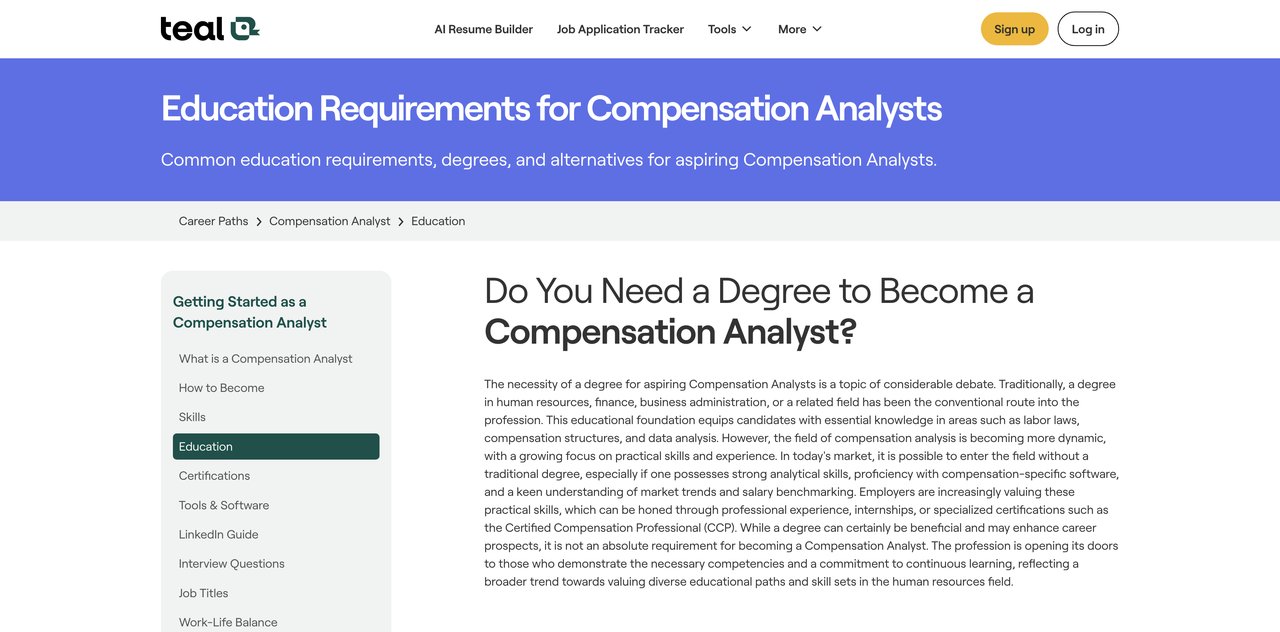
A prestigious credential for HR professionals specializing in compensation strategies and solutions, the CCP covers base pay, variable pay, executive compensation, and pay-for-performance. It requires completion of nine courses and passing associated exams.
Key Topics Covered: Base pay, variable pay, executive compensation, pay-for-performance strategies.
Target Audience and Skill Level Requirements: Designed for HR professionals seeking comprehensive compensation knowledge.
- Pros:
- Recognized industry standard for compensation professionals.
- Comprehensive coverage of compensation topics.
- Enhances credibility and career advancement opportunities.
- Cons:
- Requires significant coursework and exam preparation.
- Membership with WorldatWork recommended but not mandatory.
Certified Compensation Professional (CCP) by WorldatWork is ideal for those seeking a well-rounded, recognized credential in compensation.
Course 10: SHRM Certified Professional (SHRM-CP) by Society for Human Resource Management (SHRM)
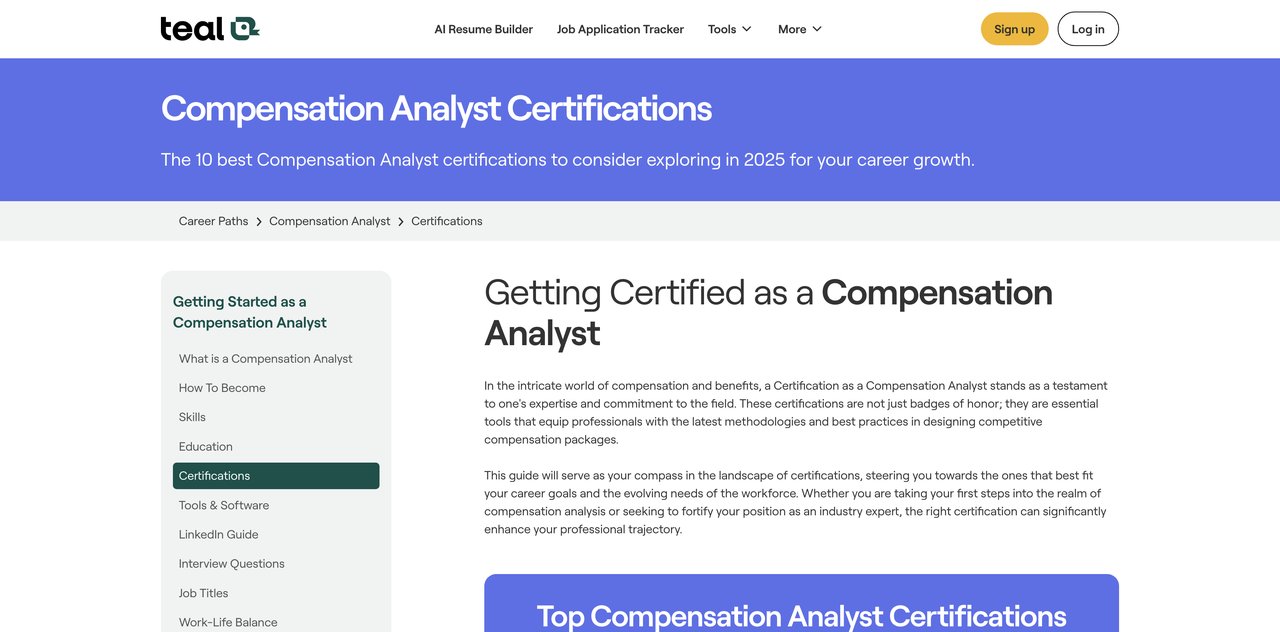
The SHRM-CP is a globally recognized HR certification for professionals implementing HR policies and strategies, including compensation. It validates knowledge in workforce management, employee relations, and talent acquisition.
Key Topics Covered: Workforce management, employee relations, talent acquisition, compensation strategies.
Target Audience and Skill Level Requirements: Suitable for HR professionals seeking global recognition and career growth.
- Pros:
- Broad HR knowledge including compensation.
- Globally recognized certification.
- Supports career growth in HR and compensation roles.
- Cons:
- Requires ongoing professional development to maintain.
SHRM Certified Professional (SHRM-CP) by SHRM is beneficial for those looking to validate their HR expertise globally.
Course 11: Associate Professional in Human Resources (aPHR) by HR Certification Institute (HRCI)
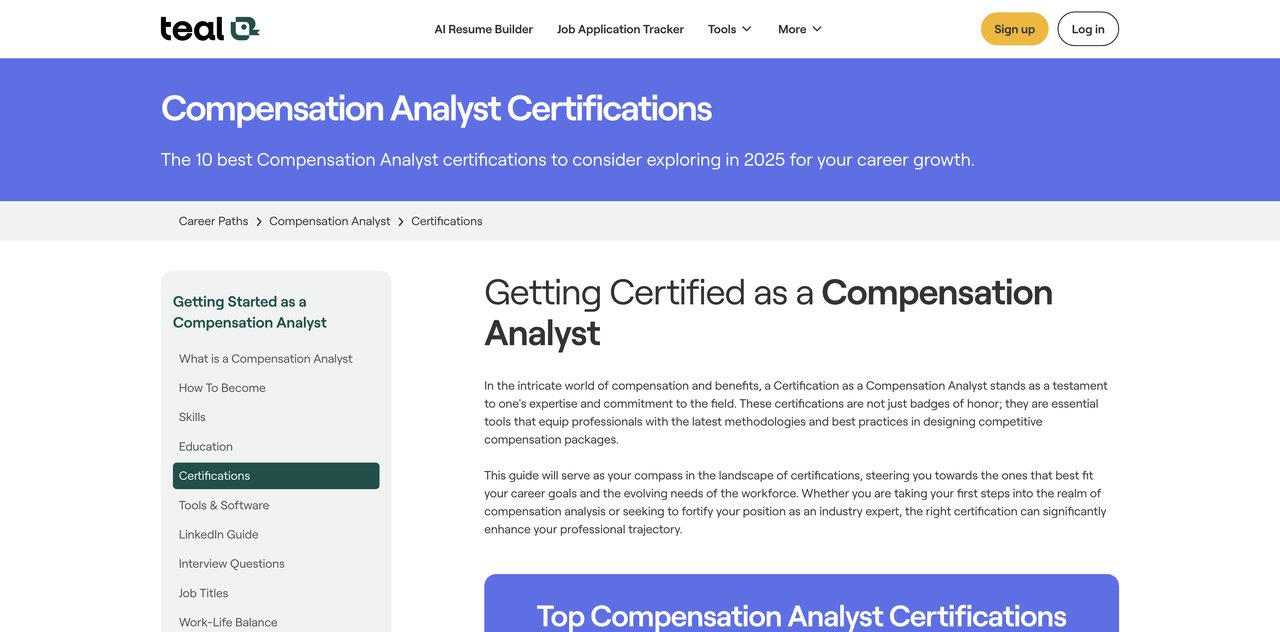
This entry-level certification is for individuals starting an HR career, covering foundational HR principles including recruitment, compensation, benefits, and employee relations. No HR experience is required.
Key Topics Covered: Recruitment, compensation, benefits, employee relations.
Target Audience and Skill Level Requirements: Suitable for beginners entering the HR field.
- Pros:
- Accessible for beginners.
- Validates foundational HR knowledge.
- Cons:
- Less specialized in compensation.
Associate Professional in Human Resources (aPHR) by HRCI is best for newcomers to the HR industry.
Course 12: Professional in Human Resources (PHR) by HR Certification Institute (HRCI)
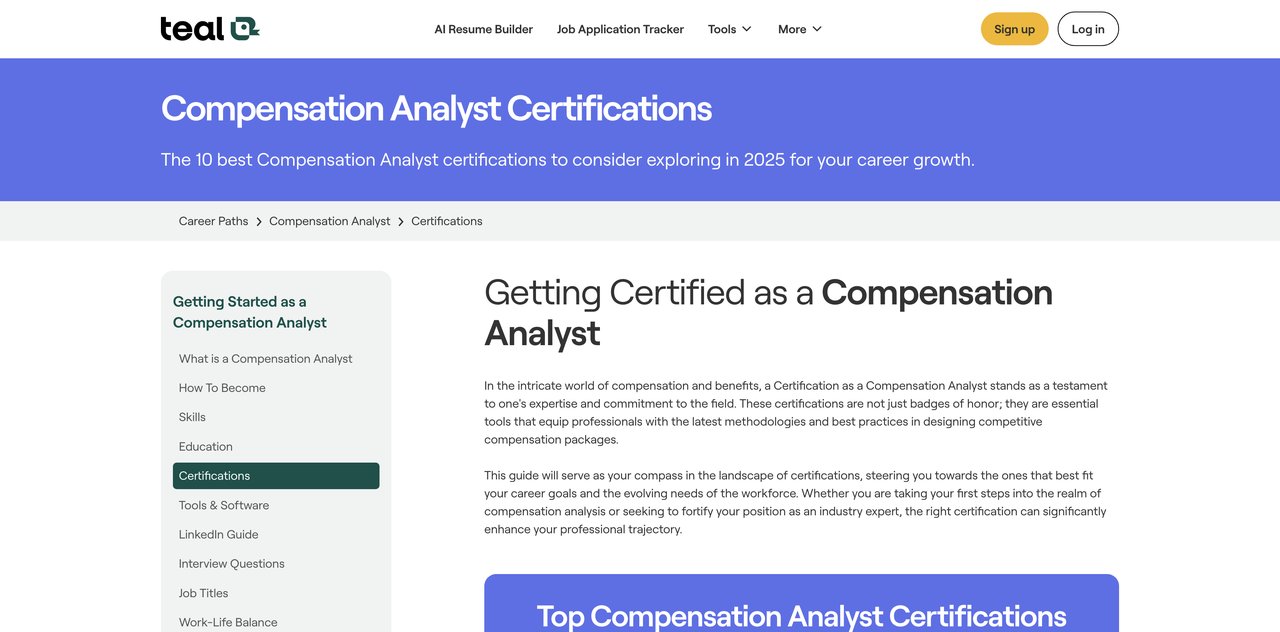
The PHR validates expertise in operational and technical HR management, focusing on U.S. laws and regulations, including compensation and benefits. It is suitable for HR professionals with 1-4 years of experience.
Key Topics Covered: Operational HR management, U.S. laws and regulations, compensation and benefits.
Target Audience and Skill Level Requirements: Designed for HR professionals with some experience seeking to validate their expertise.
- Pros:
- Recognized credential for HR professionals.
- Covers compensation and benefits in detail.
- Cons:
- Requires professional HR experience.
Professional in Human Resources (PHR) by HRCI is ideal for experienced HR professionals seeking certification.
Course 13: Certified Employee Benefit Specialist (CEBS) by International Foundation of Employee Benefit Plans (IFEBP) and Wharton School of the University of Pennsylvania
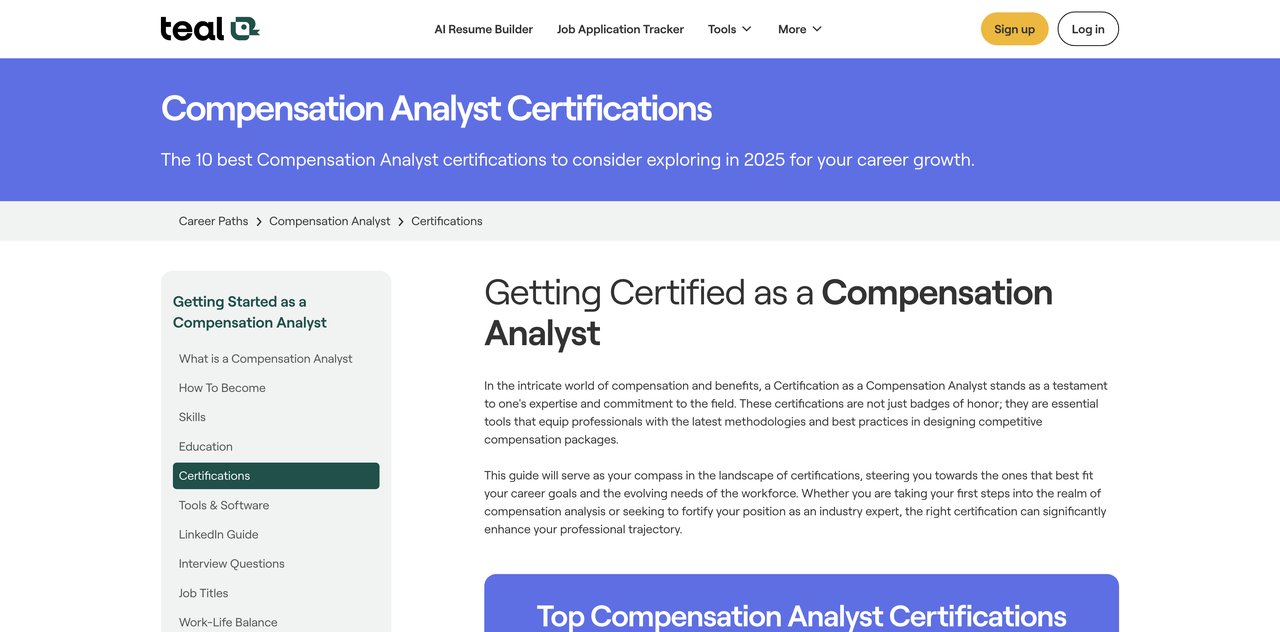
This prestigious certification focuses on employee benefits and compensation, including health and retirement plans, regulatory, investment, and strategic aspects. It requires completion of multiple courses and exams.
Key Topics Covered: Employee benefits, compensation, health and retirement plans, regulatory and investment aspects.
Target Audience and Skill Level Requirements: Suitable for those seeking a deep specialization in benefits and compensation.
- Pros:
- Deep specialization in benefits and compensation.
- Jointly offered by reputable institutions.
- Cons:
- Time-intensive coursework.
Certified Employee Benefit Specialist (CEBS) by IFEBP and Wharton is best for those aiming for specialization in benefits.
Overall Recommendations
Choosing the right AI course for compensation analysts depends largely on your career goals, current skill level, and specific interests within the compensation field. For those seeking a comprehensive, continuously updated resource specific to compensation analysts, CompleteAI Training provides excellent value with its extensive course library and daily updates. If you're looking for practical, hands-on experience with AI applications, Coursera's offerings, such as the GenAI for Compensation, Benefits and Payroll, provide flexibility and specific insights into HR functions. For professionals aiming for recognized certification in compensation, the Certified Compensation Professional (CCP) by WorldatWork offers a prestigious credential that can significantly enhance career prospects. Ultimately, the best course will align with your professional requirements, learning preferences, and long-term career objectives.




